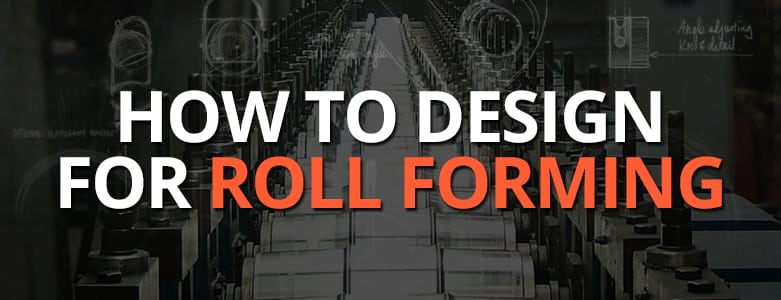If you’re considering roll forming versus press braking or stamping for your production needs, then you’ve come to the right place. At Roller Die, we truly believe that roll forming can be more beneficial than other production methods. Roll forming is less labor intensive, less costly, and can be done more quickly. The roll forming process also ensures better consistency and quality in each individual piece. Of course, these are just some of the many benefits that roll forming can have for our customers, and we are happy to discuss more specific benefits with current and potential clients.
Today, we’re sharing some tips and information on how to design for roll forming. For starters, let’s keep in mind that roll forming refers to the production process in which long sheets of coiled metal are shaped, through a series of dies, into a desired cross-section and thickness. As you can imagine, this means that the biggest challenge in roll forming is in the design process.
There are a few crucial elements that design engineers must consider before beginning the process: material, length, and shape.
Material:
As in any production method, choosing the right material is an integral part of the process. The material you choose needs to meet both cost and quality standards for your design. Aluminum and steel are desirable metals to work with, since they can easily be manipulated without losing much strength during the manufacturing process.
Length:
One of the benefits of roll forming is the speed of production, and this is where length comes into play. Roll forming can easily handle larger volumes without interruption and is great for long parts. When considering the length of the design, engineers should evaluate whether the roll forming process should include additional features, such as perforations, notches, punches, etc. to reduce production time. They should also consider whether several short parts can be made into a single longer part.
Shape:
The most important thing an engineer should keep in mind in regards to shape is how the design can reduce production time. One easy way to do this is to combine various components into a single shape.
Most roll form designs are one-of-a-kind, so there is no set way to design for roll forming. There are a variety of industries that currently rely on roll forming production methods and engineers are constantly finding new ways to improve and redefine design rules. However, the Fabricators and Manufacturers Association, Intl® has provided some great information on how to design for roll forming, including general steps that should be taken for each new tooling requirement.
Design for Roll Forming
For more information about the roll forming process or what Roller Die can do for your company, please give us a call. We look forward to sharing some of the advantages that roll forming can provide for you.

 español
español English
English English
English español
español